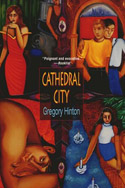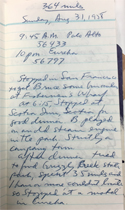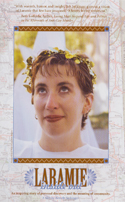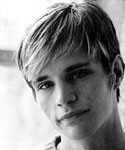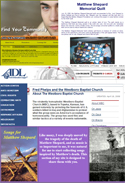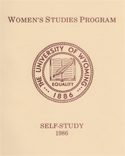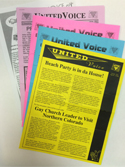Gregory Hinton Papers
Gregory Hinton is an author, filmmaker, playwright, and curator. Hinton worked as an independent curator, partnering with museums, libraries, and universities in ten states to create and produce "Out West", a historical public program which included a series of plays, films, lectures, and exhibitions dedicated to the history and culture of diverse communities in the American West. This collection contains documents related to Gregory Hinton's accomplishments and works, particularly "Out West", "Beyond Brokeback", "Cathedral City", "Desperate Hearts", "The Way Things Ought to Be", and "Santa Monica Canyon". The collection also contains files detailing his film experiences, such as "It's My Party" and "Circuit", awards received by Hinton, and posters of his works.
S. J. Moffat Papers
Shannon (S. J.) Moffat (1927-2009) was a reporter and technical writer born in Pennsylvania, who lived in Palo Alto, CA. Born Samuel J. Moffat, she served in the U.S. Navy from 1945 to 1946, then attended the Naval Academy and then Amherst College. After working in the Coast Guard from 1952 to 1954, Moffat moved to California, working as a reporter for the Star-Free Press and Palo Alto Times as a columnist and science reporter. She had a fifteen-year career with the Stanford Medical Center as an information officer, later working for Stanford University as a technical writer. She then went on to freelance as a medical writer.
Beverly Seckinger Materials for "Laramie Inside Out"
Beverly Seckinger was an independent filmmaker and professor in the School of Theatre, Film and Television at the University of Arizona, where she taught courses in film production and LGBT Studies. Seckinger grew up in Laramie, Wyoming, and graduated from the University of Wyoming in 1981. In 1998 she returned to Laramie to document the community’s reaction to the beating death of Matthew Shepard. This collection contains the raw footage and full interviews used in Seckinger’s documentary film, “Laramie Inside Out.” It includes release forms from interviews and correspondence related to the production of the film, as well as newspapers, magazines, and color photos all relating to Matthew Shepard’s murder and the production of the film.
Matthew Shepard Collection
This collection contains information about the events surrounding the murder of Matthew Shepard. Material includes sources such as the news media, University President’s Office, and the LGBT Association (now Spectrum), and includes correspondence from people in many parts of the country, news articles, fliers and posters, editorials, bulletins, and speeches. Also within the collection is information on demonstrations that took place, the debate about bias/hate crime laws in Wyoming, and memorials to Matthew Shepard. There are also lesbian and gay newspapers, posters for a drag party, and banners created by and sent to the LGBT Association. The President’s Office files include hate mail, lesbian and gay literature, memorial web sites, and hate crime legislation petitions.
Matthew Shepard Web Archive
Matthew Shepard, a gay student at the University of Wyoming, was beaten and left to die in a field outside Laramie, Wyoming, sometime during the night of October 6-7, 1998. This collection documents the impact that his murder had on people around the world, evinced in web pages, blogs, video clips, online memorials, and the websites of several organizations. The 70 websites captured by the web-crawl reflect a broad and in-depth coverage of the Shepard murder, memorials, and efforts that address inequalities based on gender and sexual orientation. These include sites such as the Westboro Baptist Church that protested at the University of Wyoming following Shepard's death and condemns homosexuality. There are also blogs written by friends, family, reporters, and people who did not know Shepard. Also included are sites of organizations related to Matthew Shepard and LGBT issues. Additionally, the websites of films, books, and music about Shepard's life and his murder were included in the website harvest. Media coverage that only existed on the Internet was included.
Rulon F. Stacey's Matthew Shepard Memorabilia
Rulon F. Stacey was a doctor and administrator at Poudre Valley Hospital in 1998 when Matthew Shepard was admitted to the hospital. Shepard died at Poudre Valley Hospital because of a severe beating received near Laramie, Wyoming. The assault was believed to be related to Shepard's sexual orientation. The collection contains a memory book relating to Matthew Shepard from the Poudre Valley Hospital employees, a photograph, newspaper clippings, and correspondence relating to Shepard.
Spectrum Records
Spectrum is a Recognized Student Organization at the University of Wyoming. Formerly the Gay, Lesbian, Bisexual, and Transgender Association, Spectrum is a club for social and political support of lesbian, gay, bisexual, trans, and queer identifying people. This collection includes newspaper articles, Day of Silence materials, artifacts from Spectrum meetings and activities, pamphlets and other resources for LGBT community (created by national organizations), and posters and fliers for meetings.
UW Department of Gender and Women's Studies Records
The University of Wyoming Gender and Women's Studies program offers students the opportunity to explore issues of gender and sexuality through a major, minor, and graduate minor in Gender and Women's Studies and an undergraduate and graduate minor in Queer Studies. The materials include self-study kits and course outlines; a diversity initiative study (2001); planning documents and publicity for Women's History Month; photographs and website captures; and administrative records. The collection is organized into two series: physical records and digital records. Both series are divided into subseries that are organized chronologically by academic year.
Wyoming Equality Newsletters
Wyoming Equality was created to enhance the lives of Gay, Lesbian, Bisexual, and Trans* (LGBT) people in Wyoming. The non-profit organization was originally founded in 1988 as the United Gays & Lesbians of Wyoming (UGLW). In 2004, UGLW changed its name to Wyoming Equality. The organization provided education, social activities, support, and an advocacy system. The collection contains newsletters that document the work of United Gays & Lesbians of Wyoming and its successor organization, Wyoming Equality.


